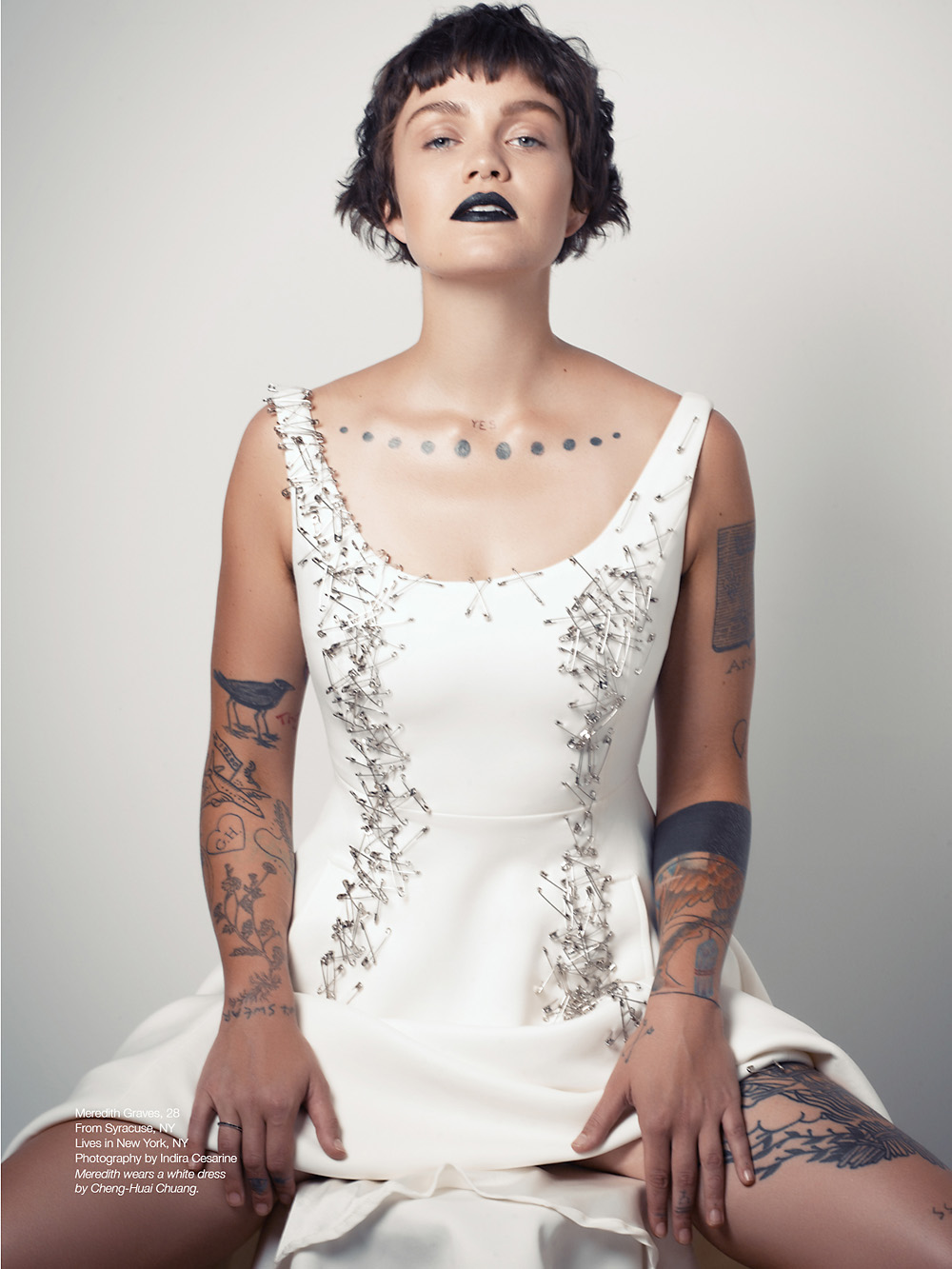
“I grew up a precocious, trouble-making, obnoxious, hell-raising child, who just wanted to sing and make loud noises and be on stage.” This being Perfect Pussy frontwoman Meredith Graves’ constitution, it makes sense that her interview with us would take place in the midst of an epic tattoo session during which she was receiving her very first knee tattoo – both incredibly painful sounding but also totally badass in the indelible manner so unique to her artistry and life. Eliciting polarizing emotional responses from her fans and foes alike is something she’s quite accustomed to, and which to some extent she embraces and even seeks out with the music Perfect Pussy creates. Though the style the band currently crafts is perhaps accessible only to a subculture of music aficionados and punk or hardcore fanatics, growing up those genres were common place in her household, along with a host of creative influences from across the spectrum.
The political seeds of Graves’ life and work took root in her early years, and have now come to define every aspect of her creative endeavors. To that end, she takes the metaphorical megaphone that comes along with fame seriously, and feels an attendant responsibility to make the world better through her position. Among the various issues of importance to Graves, women’s rights rests at the top, though for her, feminism walks hand-in-hand with socioeconomics and race. Sexuality and sexual politics are also at the top of her list, and of course influenced her much-discussed use of the word “pussy” in her band name. Though Graves has been unduly cast by the media as a shrewd man-hater, her attitude toward subverting the patriarchal paradigms is nothing but well-thought, concise and totally intelligent.
It’s an exciting year to come for Graves. Her publishing house is flourishing, and Perfect Pussy will be releasing a highly-anticipated sophomore album in the spring of 2016. Read our full interview with Meredith Graves and editor-in-chief Indira Cesarine for The Untitled Magazine’s #GirlPower Issue below:
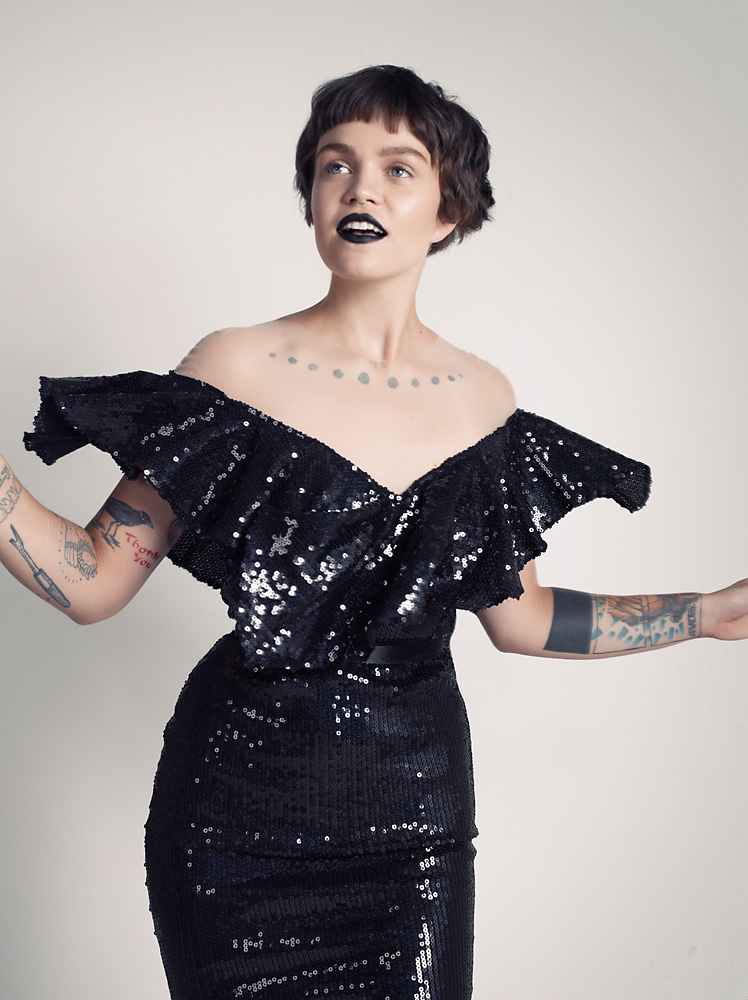
Indira Cesarine: Are you getting your tattoo?
Meredith Graves: I am. I’m in a special kind of hell right now. It’s my first time having my knee tattooed. I’m in a nightmare world right now. This is the second interview I’ve done while getting tattooed.
IC: And what does the tattoo look like?
MG: It is a giant honeycomb over my entire knee with bees flying around it.
IC: That’s pretty intense.
MG: And its says the word “queen” in Russian.
IC: What was your inspiration?
MG: Well, I love bees. I’m a pretty avid gardener when I’m not living in the city. I’m a big believer in sustainable agriculture. I’ve always been really into that. But earlier this summer, a journalist at The Guardian over in the UK, referred to me as the “New Queen of Hardcore” and people lost their mind. People were so offended.
IC: The new queen of hardcore. Why would anyone get offended by that?
MG: Because it’s kind of a silly label and there are lots of queens in hardcore. There’s no such thing as a “new queen,” there’s no monarchy. So people flipped out, but I thought it was really sweet and really funny. I love that it made people mad. I know the person who wrote the article a little and I will say, a lot of people don’t know when they’re being trolled. So someone who understands the anger that feminism and feminist thought raises in some people, calling me the “new queen of hardcore” – that’s trolling. People didn’t get it and it was hysterical to see how mad people got, so I valued that moment that I would get some sort of “queen.”
IC: Being the queen of hardcore is pretty fucking cool. I would just take that title and run with it.
MG: My between birthday is Freddie Mercury, so I was literally born to be a queen.
IC: And you’re getting it tattooed on your kneecap so now you’re officially a queen. There’s no escaping it.
MG: I love that there are bees everywhere. It’s great; Bees are very positive symbols and in Greek Mythology they were symbols of female priestesses. The history of Greece was represented by bees. There were bees in and around the temples.
IC: What your childhood was like?
MG: I grew up in Upstate New York, very very far up state between Syracuse and the Thousand Islands in a few different places. I had a father who was a writer and a mother who was an actress. We kind of lived in our own family world, very close to my extended family. The only two things I’ve ever done because of my parents was music and writing. I could’ve grown up to be anything, but there’s never been a time in my life when I haven’t been performing on stage and writing. I grew up a precocious, trouble-making, obnoxious, hell-raising child, who just wanted to sing and make loud noises and be on stage and have everyone looking at me and write things. That was my childhood.
IC: And your mother, did she have a lot of creative influence on you?
MG: My mom is definitely the strongest influence in my life. If my mother tells me something, even if I hate it and disagree with it completely, I will think about it for weeks.
IC: They have that tendency don’t they?
MG: My mother and I are very close because we are extremely similar. We look exactly alike, down to the short hair.
IC: So growing up, you had this incredible sort of rebellious, outrageous, and creative kind of upbringing. What sort of musical influences did you have?
MG: My father listened to jazz mostly. He raised me with everything. He also loved Bruce Springsteen and punk and hardcore. I always had punk rock in the house. I never understood it as a subversive thing. For me, it was like my dad’s music. You know, it wasn’t until I got a little older and got into hardcore, maybe around age eleven or twelve, that I really started to get the political side of hardcore. Before that I was like “Oh, The Ramones, The Clash, Blondie, Television.” I got the artistic rebellion but I never got the political rebellion. So that came a little later. My mother listened to musical theater. She was very into performing, she was always in shows. So I grew up doing musical theater. I would be listening to records with my dad at home, then I would be going to rehearsal at night and I’d be in Bye Bye Birdie or A Chorus Line or any of the shows I did through high school. I grew up loving punk and hardcore, loving avant garde jazz. I grew up with Ornette Coleman and then I would go sing show tunes at night. Weird, weird childhood.
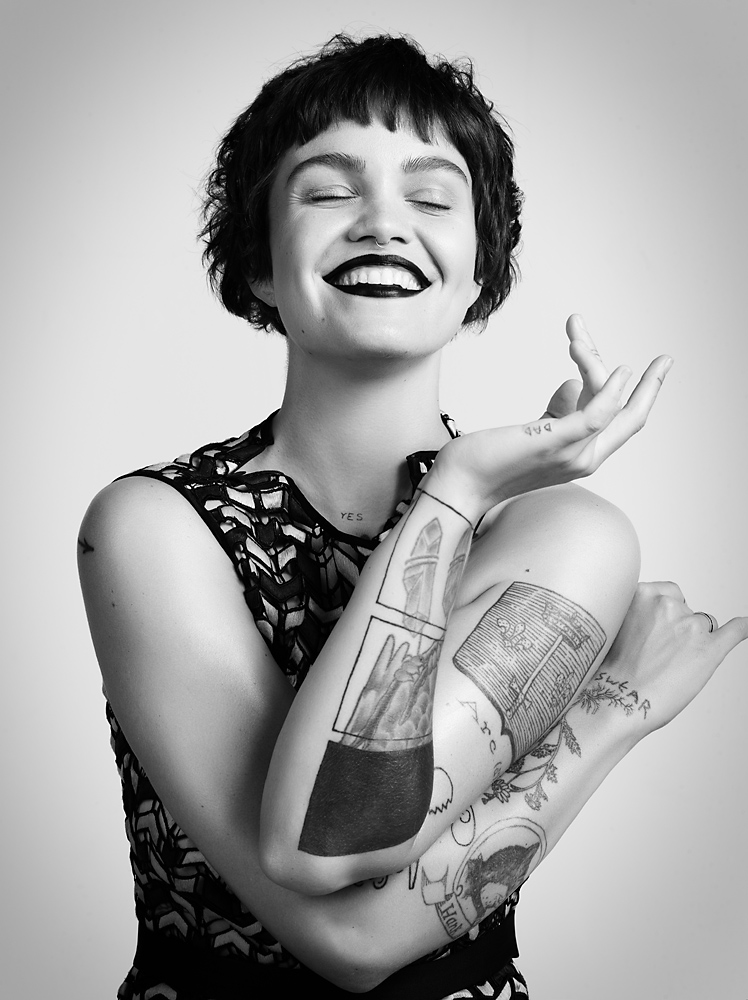
IC: I understand that you initially formed the band as a fake band for a movie and then one thing led to another and you guys actually ended up staying together?
MG: The three of us got together to be in a movie, knowing that we wanted to end up together anyway. We didn’t do anything for a year and then other people were like ‘hey are you still doing this because we want to be in a band’ and that’s when the band really started. But it’s not as exciting as people initially made it out to be. It was just a funny story to tell people in the beginning because when we first started getting interviewed we only had four songs and we had only played four shows. We didn’t really have much to talk about. So we were in a movie, but that’s not really how it happened. We told the truth, we just made it more interesting than it was.
IC: How has the band evolved since you guys first formed?
MG: Oh everything’s changed. We wrote our record never having played any of those songs live. We wrote it in the studio in a week, start to finish – writing, recording, mastered everything in less than a week. Then we went out on tour. The songs we wrote have taken shape over the last year and a half. The songs we wrote in Syracuse were not the songs we played in Australia. We’ve gone through lineup changes, we’ve gone through equipment changes. We’re changing it up again for our new record. It’s different, but we’re the same people. It’s evolving, but no matter who’s in the band or what kind of music we’re writing. The point of this band now and always has been the people in it. This band exists as a mutual support system and a safe space and an outlet before it exists as a collective entity that gets on stage together every night. We are family before we are anything else. When I think about historic times and places in certain cities – where in certain artistic movements, small groups of people have banded together and made art together, with and for each other. They pair it to the 1920s or Berlin or in New York in the 50s. The people in the band and our extended friend group, that’s kind of what it feels like. It’s a very exciting time to be a part of this group of people. The people in my band are my best friends and they are the most talented, intelligent, supportive, generous, and caring people I have ever known in my life. I’m lucky to be able to make art near them in this band and in all of the band our friends are in. We’re so lucky to all be doing this together.
IC: That’s so awesome. So how would you describe your sound in your own words? Would you consider yourself punk?
MG: I think it’s very abrasive. We’re just very abrasive music. Very unpleasant to listen to.
IC: Do you feel that part of the process is that you like to be abrasive to make a point?
MG: It’s not the point, but we’re lucky that it turned into that. Other bands I have been in were a lot less abrasive. This band just happens to be abrasive. It’s not like I love it and I’m trying to go out and piss people off. That’s just the kind of music that we’re writing together. So for now we’re going with that.
IC: The title of your debut album, Say Yes to Love, that’s not highly abrasive. It’s actually kind of romantic. Can you tell me about the inspiration for the album name?
MG: That’s actually a lyric from one of the songs on the record and it’s the only time in the record when there’s silence. That song’s actually very sad. It’s about something very sad that happened to me. I was very in love with some one. I was very, very, very, in love…probably in love for the first time. I was going to marry this person for a variety for reasons, not all of which were romantic. There were some immigration issues. Then he cheated on me and dumped me. At the time, I was working in a gown store and hemming some wedding dresses for friends because I used to be a seamstress. That was my job before I became a full time musician. I worked in a shop selling prom dresses and wedding dresses. At home, I ran a business tailoring and doing alterations and I worked with a lot of brides that summer. So after the love of my life left me, I had to go to a bunch of weddings and I was so pissed off. I was so mad because I had gone my whole life thinking that I was some kind of anarchist in a way and marriage is fate and I don’t want that. I was sad and so lonely. That’s where the title comes from. It’s about being left by someone that I loved very dearly. We have slowly come around and are very much a part of each other’s lives now. So everything worked out in the end.
IC: Maybe it was meant to be that you should be friends. He was supposed to cathartically kind of allow you to write that song.
MG: Precisely. If he hadn’t left me none of this would’ve happened.
IC: Sometimes emotions are the catalyst to great things.
MG: More literally than that, he broke up with me right after I took him to the band’s first out of town show. We took him in the van. I remember because we played out of Syracuse for the first time and our show was in Philly. I hadn’t played a show out of town in years. I had quit hardcore partying. I said ‘I’m done; I don’t want to associate with these shitty people anymore.’ I went to the show and people were really excited to see me and they really liked the band and I was like ‘oh my god, I get this part of my life back!’ I was so happy he was there to share it with me and two days later we broke up and he said ‘I saw you on stage the other night and that’s what you’re supposed to be doing. You’re not supposed to be a housewife in Syracuse, New York. I can’t keep you.’ Three months later, we had a record deal and we were writing a record. We had blown up over night. I don’t know how he knew but he knew.
IC: He was kind of leaving you to have a life that he couldn’t offer you.
MG: Exactly. That’s why we still love each other very much.
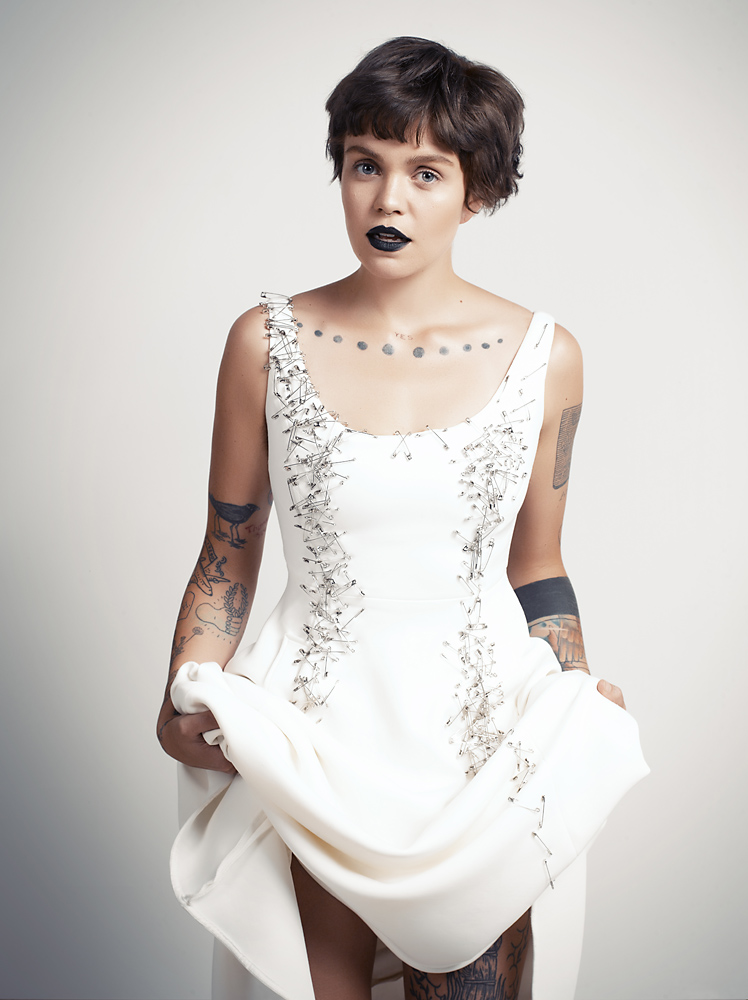
IC: Do you write the music for Perfect Pussy? Or is it collaborative?
MG: I just write the lyrics. We all write together. We sit together and say ‘oh do this, this sounds cool.’ Pretty simple. There’s no elaborate writing process. We smoke a lot of weed and we love each other very much and we have a lot of honest conversations.
IC: You have spoken up a lot about how the way people are treated in the industry is bullshit. You said it’s kind of like momentum to speak out with regards to negative role models, racism, and sexism. Do you feel like it’s important to use your position as an artist to bring up issues that strike you as inherently wrong?
MG: That’s the only reason I’m still doing this. Honestly, me being in a band doesn’t differentiate that much from the status quo. I’m a semi-attractive, able-bodied white person; this existence alone isn’t going to change things. I’m not going to change the status quo by being physical. I look more like Taylor Swift than some of my own role models. But I have space, there is a space because of this band and I can’t take that for granted. I feel moral obligation to continue having these conversations and to bring things up even after people want to stop talking about them. That’s what you do when you’re lucky enough to be privileged like I am. All the ways in which I’m privileged are logically, the reasons that I’m in the spotlight. When you’re in a position of privilege, it’s your obligation to figure out a way to use it to lessen the evil and to increase the sense of quality in your immediate surroundings. For me, having all of the privileges I have and now being in the spotlight – the only logical extension of that is trying to help as many people as possible by harping on these issues and making sure they stay in the front of whatever we do as a band.
IC: When you think about these causes or issues, what really resonates with you? What do you feel most strongly about?
MG: I feel very strongly about all of it. The way that oppression works in America and in the world right now means that you can’t isolate any issue. The intersections of race, gender, and class are where all of the problems lie, thanks to capitalism. You can’t really say which of these issues is the most important because there is no feminism without black feminism, trans-feminism, and feminism of class war. I really don’t feel comfortable highlighting a specific issue right now. But it still needs to be said, we need to abolish the police. The police system in the United States is not functional. Cops are power hungry and are killing black kids. ‘Fuck the cops’ is the big issue I care about right now. Police are letting the murderers of transwomen walk free. Police are breaking up peaceful protests held by First Nations people who are trying to prevent global oil companies from drilling on their land. Police are killing black women as a result of breaching traffic stops in their cells, like in the case of Sandra Bland. The police in America are a psychotic task force designed to keep people afraid. We need to figure out an alternative to police. That’s the big issue. The police state is fascism. The police in America are very quickly turning into Nazis. They are acting on behalf of the wishes of their overlords without actual, genuine regard for human life.
IC: This is our girl power issue and it revolves around female empowerment and feminism. It would be great to talk to you about your beliefs on some of those subjects. I am assuming you consider yourself very much a feminist?
MG: I would like to say no and get that in there just to fuck people up but it’s not true.
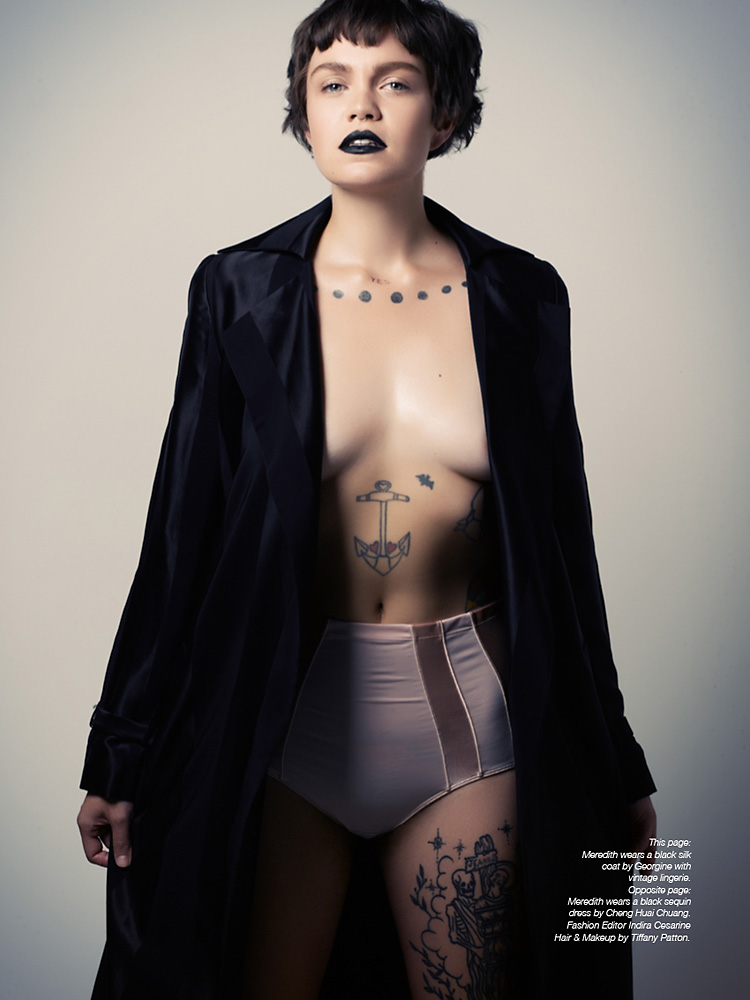
IC: What does feminism mean to you?
MG: My feminism is aligned with the definition of intersectional feminism coined by Black feminist educator, Kimberlé Crenshaw. Intersectional feminism means that I understand my gender as part of my identity. I understand gender as it factors on all different places on the spectrum of privilege and oppression. Being a feminist means I understand how being a woman fits into the ways in which all people oppress. Every time you try to define feminism, you’re leaving something out. You left the house without your keys. You’ve got your phone, you’ve got your wallet, but you locked yourself out of the house. I don’t want to lock myself out of feminism by trying to define it. Intersectional feminism means a feminism that is larger than the gender pay gap, abortion, or armpit hair. That’s what a lot of people refer to as white feminism. It’s important to talk about trans feminism, feminism in race, and the way that women of color are erased from the conversation about feminism. It’s about motherhood, healthcare, education for women in the Middle East, and the kidnappings of journalists worldwide. Intersectional feminism means understanding mens’ place in feminism. It’s about thinking about feminism in communism. It’s about feminism for women in the work force. It truly is about looking at the places where being a woman or being a feminist intersect with other points on the map. It’s an active understanding, it’s not a pile of books that I’ve read. It’s me trying to understand the intersection based on my lived experience as a women. Like I said, I’m trying to not lock myself out of the house.
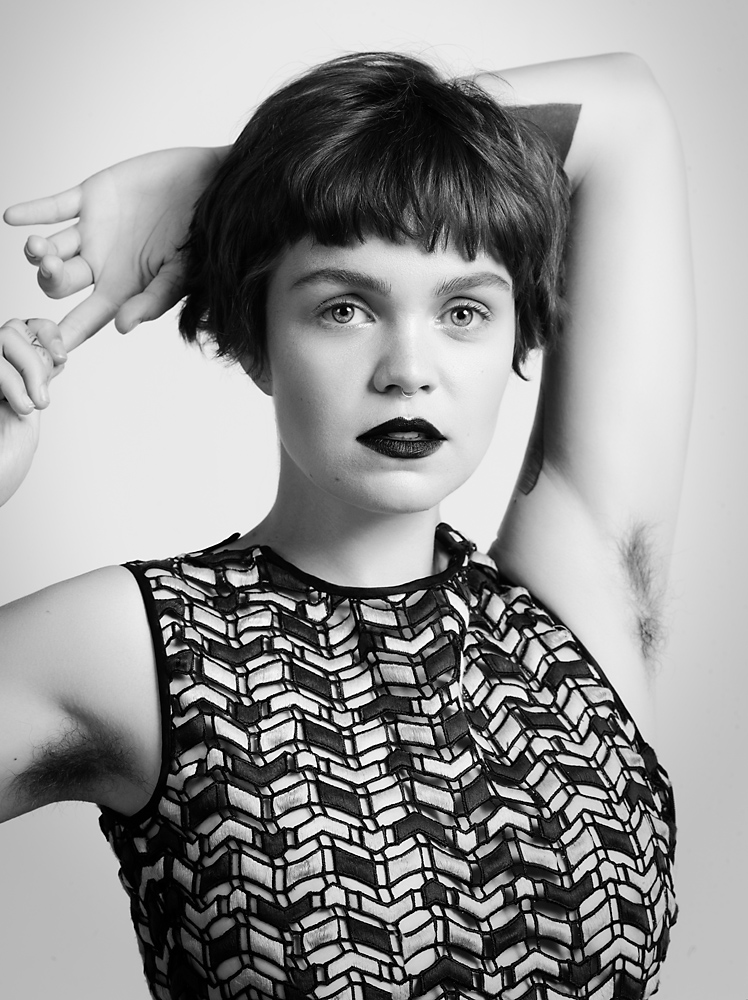
IC: Yes, you don’t want to overly define it or categorize yourself as one way or the other. I noticed that you make a point of not shaving your armpits. Is that for you, a feminist statement or just a personal preference?
MG: At the end of the day it doesn’t matter. Whether it’s a feminist statement or a personal preference. Whatever reason I have for not removing my body hair – the world doesn’t care and harasses me for it anyway. I don’t need to justify my choices. Other people need to justify their harassment of me and anyone else who doesn’t choose to shave. We live in a culture where body hair is so feared, but simultaneously prized in a strange way. As a young white feminist, not shaving my armpits, people ask me if it’s a political decision; whereas I have brown friends who grew up being shamed by their classmates for having thick eyebrows. The body hair debate starts and ends with ‘everyone has a body, get the fuck over it.’ It’s so boring to talk about fucking body hair. Everyone has the type of body they have. Everyone can do whatever they want to it; that’s all it is. That’s the only way in which I was considered a feminist. Frankly, I get a rash on my armpits when I shave and that’s a horrible thing. So I don’t shave my armpits. In a way, it is a feminist statement to do what you want with your body. But, the idea of shaving or not shaving as an inherently politicized act is white feminism to a T.
IC: As a society, what sort of progress do we need to make to move towards gender equality? What are particular things that you see as problematic?
MG: We need to look at who we’re talking about when we say “we as a society.” We live in a country with thousands of micro societies, defined by lines of race, class, and gender. People always want to say the statistic that ‘women make x amount to a man’s dollar’ but White, Latina, and Black women make different amounts. They’re divided and most people don’t know those statistics. We need to work on creating a culture that equalizes all women. That’s where we need to go as a society. We need to work on taking the largest group and working our way down. That’s where we need to start.
IC: I understand that you launched your own publishing house and record label as well. Can you tell me about those projects?
MG: I started a really small label and I’m planning on doing some publishing. I’ve got some books that I’m working on. It’s called Honor Press. It is just a little extension of the punk label we ran out of our apartment in our late teens and early twenties. We are just putting out records by bands I like, books for my friends, and hopefully, a lot of really far out stuff. Artifacts that should be on Earth for future teenagers.
IC: Are there any particular acts that you are really excited about working with?
MG: I’ve put out only one record so far. I’m taking it very slow because I’m still wrapped up in writing full time, being with the band, and doing a lot of yoga. The one band I’ve put out so far is a band from Sacramento, California, called So Stressed. They are my favorite hardcore band. The record is the best record I’ve ever heard in my life. It’s called The Unlawful Trade of Greco-Roman Art. The first time I heard it, I cried hysterically. It is the perfect record for me. It’s about living every day with social anxiety in an already difficult world. That’s a real thing.
IC: What are you guys doing with the publishing house or is it something that you do on your on?
MG: I can’t talk about any of the projects right now because nothing is set in stone. But people can send more demos to me. I’m a totally open book. I get a dozen emails every day from kids who want to talk about their band, books, and stuff that they want to do.
IC: That’s exciting.
MG: It’s amazing.
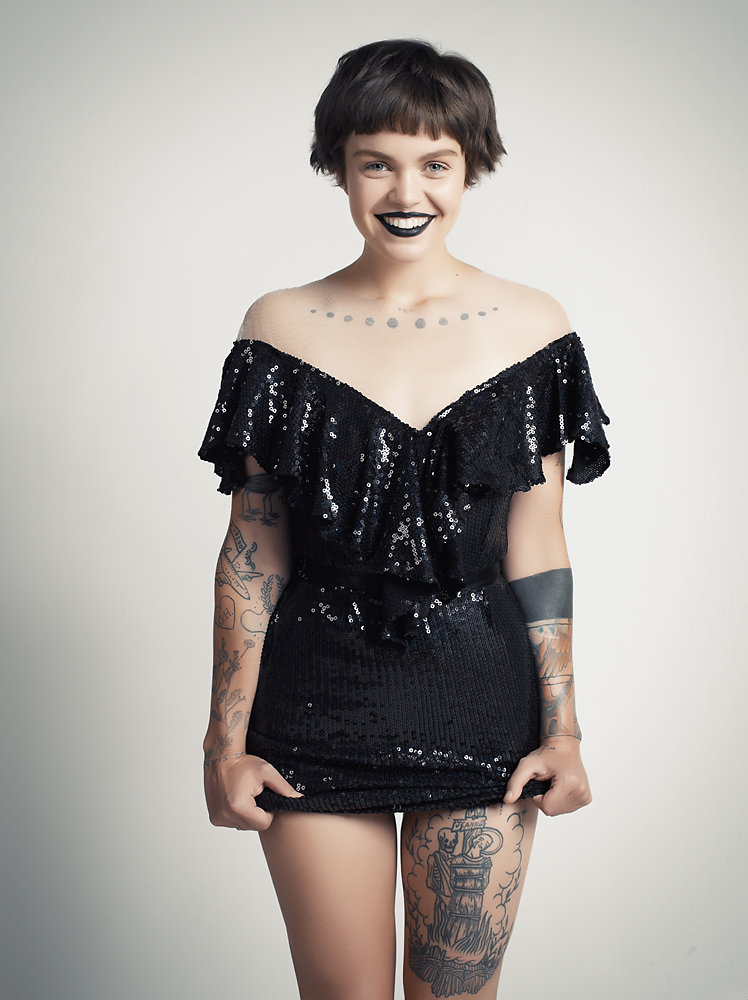
IC: Now, Perfect Pussy. Tell me about the name.
MG: I would really rather not. If I get asked that question one more time, I’m going to put a pinhole through my forehead. I’m about to start making shit up. I’m going to say it’s my grandmother’s maiden name.
IC: Well it is a very provocative name.
MG: Yes, but why?
IC: Because it is a part of female genitalia that often isn’t referenced in music.
MG: But it’s often referenced in a ton of other areas of culture. It’s a weaponized word when it is used by men as a slur. “Perfect Pussy” comes from porn. It’s a popular porn search term and in that porn, it’s usually girls that look as young as humanly possible. It’s a provocative, politicized term when a hairy, outspoken, obnoxious person, pushing thirty, is using it to make music that annoys people. But when those people are at home Googling it, trying to search underage Russian girls, it’s not provocative. Porn culture is a graveyard. It’s provocative to people because I’m not sexy, because sex is only good in America when it’s on display and being sold. We’ve taken the sex away from the porn industry. It’s provocative because we’re not using it to give people what they’re used to.
IC: Exactly. You’re juxtaposing the expression and you’re being very intellectual about the term.
MG: We’re sex negative feminists. The whole culture of sex positive feminism is really damaging, awkward, and weird. I’ll just say I’m a sex negative feminist.
IC: You’re pretty sexy. So I don’t know if you can say that.
MG: You might be the first person that’s ever thought that.
IC: In the photos yesterday, you and that trench coat were seriously sexy.
MG: It’s fun to be in a body. It’s fun to have a body.
IC: I think you underestimate your own sex appeal.
MG: I think I don’t care about my own sex appeal because my entire life, I’ve been told that my sex appeal is a constant issue. I’ve had to live under the ostracism that my value is directly based on my appearance and then penalized for not having that appearance be what other people want. I’ve been sexually violated in private and in public by men. That’s how capitalism has affected sexuality in our country. My sexuality and my sexiness has never benefited me, until recently. So that’s why I don’t give a fuck about being sexy. If you’re sexy in America, you’re fucking penalized for it. So I don’t care about being sexy, I don’t want to be sexy. I want to survive.
IC: Don’t you think that the fact that women are penalized for being sexy is a root of misogyny?
MG: I do, but it’s part of a larger conversation.
IC: I would rather embrace “sexy” as being a woman’s right.
MG: Yes, but before we talk about that we have to talk about how our cultural definition of what is sexy has been shaped. Things like colors, transphobia, and disability politics have informed our idea of what’s sexy. Some bodies are only considered sexy when it’s a fringe fetish. We need to move sexy away from porno culture and promote a safe and health sexuality where everyone is allowed to feel sexy and encouraged to be sexy regardless of the rigid standards that our culture has developed that says that only a certain type of body – a body that scarily looks like the one I live in – is sexy.
IC: I agree, all of those definitions need to be redefined.
MG: There also needs to be room for people that don’t give a shit about being sexy. Everyone is sexy if and when they want to be. People that do not care about being sexy are not obligated to be. That is important.
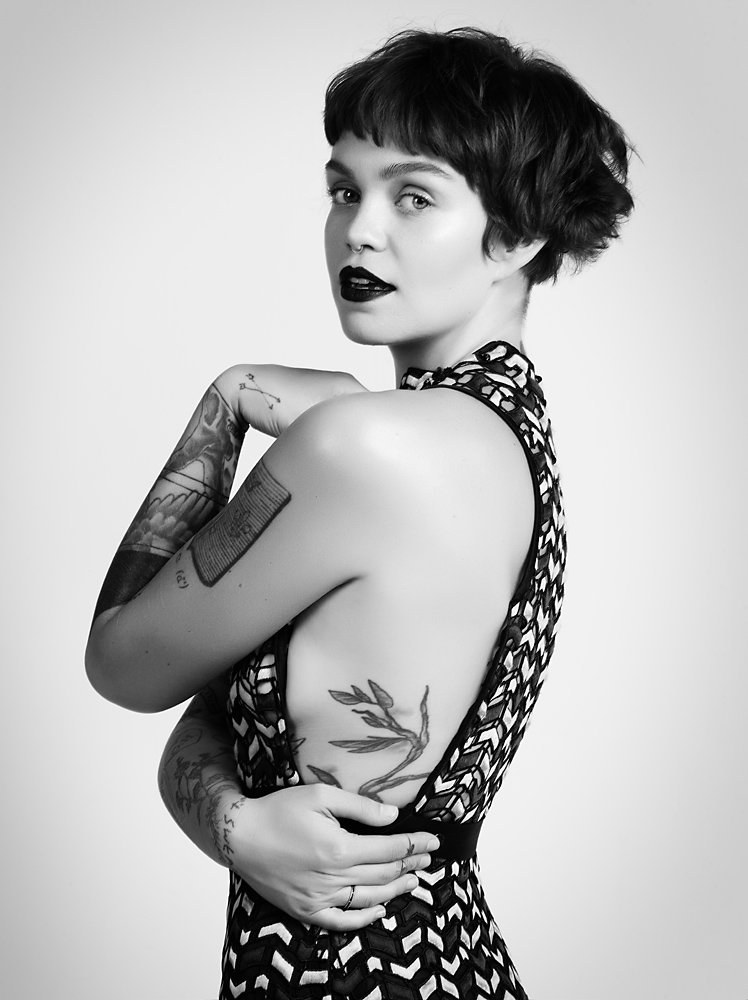
IC: Did you ever feel like you had to overcome any obstacles in being a female hardcore artist? Do you feel like there is an overly male dominated kind of attitude in the music industry?
MG: I feel like everything in the world is male dominated. I don’t sit around smoking and thinking about how awful men are so much as I just constantly ignore them. I’m just eliminating them from the conversation completely. I have a lot of men in my life that are amazing – my boyfriend, my bandmates, my father, my editor. There are men in my life that are incredible. For the most part, I just engage with men as little as possible. The only way for me to see the dismantling of the patriarchal power structure is to obviate in my everyday life. I just actively choose to interact with very little men. I don’t want any more male influence in my life than the world already forces on me. I choose to be away from most men. It’s served me really well.
IC: I know that you’ve been working on your own label and you’re busy with the band. Do you have any new tracks that you guys are releasing or a new album in the works?
MG: Perfect Pussy is writing a second record. I’ve got a bunch of releases that are going to be announced soon on my label. I’ve been writing a solo record slowly last year, but I’m suffering from severe voice problems. I woke up this morning with no voice. I have a bunch of crazy stuff coming up that is really cool. Ray, our guitar player does a solo project called MKSearch, it’s amazing. Garrett and his partner, who is a part of our extended family and our new bass player, Allie Donahue, are starting a new communal house in Philly. Sean, our keyboard player is in a new band with one of the guys from Delicate Steve and one of the guys from Rubblebucket. They’re amazing. Sean also has a solo project called Pretengineer. The rest of the band is doing way cooler stuff than I am. I can’t even talk about half the shit I’m doing. It’s all music and writing related but I’m not violating the trust of the people that are putting their faith in me and helping with projects that aren’t anywhere near done yet.
IC: Will your new album come out some time in 2016?
MG: In the spring of 2016.
IC: Do you know the title?
MG: I do, but I’m not telling anyone. I know everything about it. I know what’s it going to look like and I know what it’s going to feel like when I hold it in my hand. I’m really happy.
Meredith Graves interview by Indira Cesarine
Photography & Styling by Indira Cesarine
Hair & Makeup by Tiffany Patton


